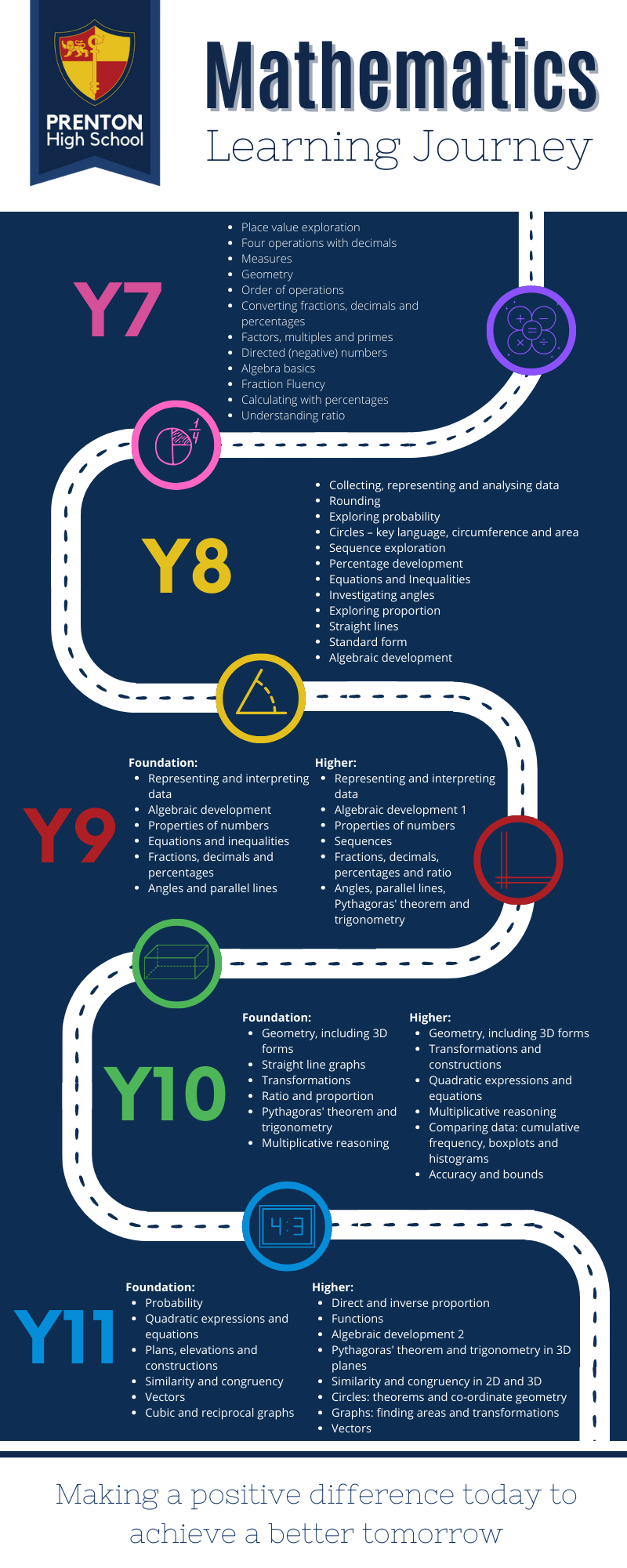
Video
Subject Information
Learning Journey
The curricula in years 7 and 8 consists of 24 units of work in total. All students, wherever possible, follow the same curriculum, but extension objectives allow for exploration in more depth for some. The curriculum at this stage is designed to embed and extend number skills as well as exploring the essential algebraic skills needed for success at GCSE. The units will build upon previous material taught, so that students have a greater exposure to the topics and in a different format, for example ratio is further explored through currency conversion and scale.
The curriculum has also been designed with other subjects in mind. For example, measures are visited early in year 7 to support learning in Design Technology, whilst standard form is taught in year 8 as this supports the learning in Science. To support students in their application of their mathematical skills we have introduced “Wordy Wednesdays” in both years which allow all students across the school to practice their application of skills to worded problems.
Table of Topics
| Year 7 | Year 8 |
| Place value exploration Decimals Measures FDP Factors, multiples and primes Arithmetic sequences Manipulating fractions Directed Numbers Algebra Basics Fraction Fluency Order of operations Exploring geometry Calculating with percentages Understanding ratio Collecting, representing and analysing data | Rounding Exploring probability Extending fractions Circles – key language, circumference and area Extending negative numbers Sequence exploration Percentage development Investigating Angles Exploring Proportion Straight Lines Standard form Algebraic Development Equations and Inequalities Bivariate data |
We aim to enter all students for GCSE mathematics. We follow a three year GCSE course, starting in year 9, which allows us to explore the GCSE course in depth and use the skills acquired in Y7 and Y8 to access more demanding mathematics. Our aim is to create confident, numerate students who are well equipped mathematically to continue their life beyond school.
GCSE maths is tiered and so students either follow the foundation tier scheme of work or the higher tier scheme of work. All students, however, cover the same five broad areas: number, algebra, ratio and proportion, geometry and statistics, but at different rates and at different depths, dependent upon their tier of entry.
As well as learning new concepts, we support students in applying their mathematical knowledge through use of our Wordy Wednesday booklets which contain ‘wordy’ problems designed to help students to see where their maths skills might be applied in a ‘real world’ context. In addition, GCSE mathematics provides students with essential skills for other key subjects such as Science, Geography, Computer Science and Food & Nutrition, as well as providing students with the tools they need to flourish beyond school.
Table of topics
| Year 9, 10 and 11 – Foundation Maths | Year 9, 10 and 11 – Higher Maths |
| Representing and interpreting data Algebraic development Properties of numbers Equations and inequalities Fractions, decimals and percentages Angles and parallel lines Geometry, including 3D forms Straight line graphs Transformations Ratio and proportion Pythagoras’ theorem and trigonometry Multiplicative reasoning Probability Quadratic expressions and equations Plans, elevations and constructions Similarity and congruency Vectors Cubic and reciprocal graphs | Representing and interpreting data Algebraic development 1 Properties of numbers Sequences Fractions, decimals, percentages and ratio Angles, parallel lines, Pythagoras’ theorem and trigonometry Geometry, including 3D forms Transformations and constructions Quadratic expressions and equations Multiplicative reasoning Comparing data: cumulative frequency, boxplots and histograms Accuracy and bounds Direct and inverse proportion Functions Algebraic development 2 Pythagoras’ theorem and trigonometry in 3D planes Similarity and congruency in 2D and 3D Circles: theorems and co-ordinate geometry Graphs: finding areas and transformations |
| Exam board: (GCSE Edexcel 1MA1) Foundation Tier |
| Externally assessed examinations covering any part of the specification Paper 1 Non Calculator Papers 2 and 3 Calculator allowed Length of each paper 1hr 30 mins Each contributing 33.33% of the final grade |
| Exam board: (GCSE OCR J560) Higher Tier |
| Externally assessed examinations covering any part of the specification Paper 4 Calculator allowed Paper 5 Non Calculator Paper 6 Calculator allowed Length of each paper 1hr 30 mins Each contributing 33.33% of the final grade |
Find out more about the Edexcel Foundation Tier qualification.

Miss R Lavery | Subject Leader – Mathematics | laveryr@prentonhighschool.co.uk

